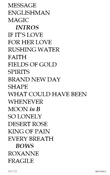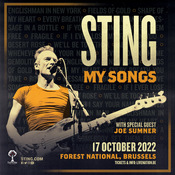
Sting @ Vorst Nationaal: King Sting...
We've said it before: Sting is a pop genius. That has its advantages. He reportedly still earns two thousand dollars a day in royalties for "Every Breath You Take," a song from 1983. He's sold over a hundred million albums, including his band The Police and solo albums. And in February of this year, he sold the rights to all his music for a cool $350 million. So Sting isn't in it for the money anymore. Not for a long time.
Perhaps that's why we don't really remember a global hit from the last two decades. Sting now only makes music for himself: including an album with music by John Dowland (1563–1626) (yes, you read that right), an album that goes with a musical about Sting's childhood memories of the shipbuilding industry in Wallsend, and a whole string of collaborations (Mary J. Blige, Alison Krauss, the Black Eyed Peas…) have all been featured.
In 2019, Sting did something we found incomprehensible: he recorded My Songs, fifteen reworked versions of his most famous songs. Why, among other things, would you rework a song so good that it still earns you two thousand dollars a day almost forty years later? As if Da Vinci were to say, "I'm going to make a new version of the Mona Lisa." Anyway, for this My Songs tour, we went to a nearly sold-out Vorst Nationaal yesterday. We happened to be wearing Iron Maiden t-shirts, so we kept our hoodies securely fastened so as not to cause a stir among the audience, which consisted mainly of well-mannered people in their forties, fifties, and older.
Along with them, we got two Sumners for the price of one, because Sting's son, Joe Sumner, was the opening act. He came onstage, cheerfully blowing his head off, all alone, with an electro-acoustic guitar around his neck. It quickly became clear that he hadn't inherited his father's pop genius (but let that not be a reproach): we got the impression we were mainly watching and listening to a street singer. A likeable street singer, nonetheless. The audience managed to keep chatting throughout his entire set and sometimes even gave more than polite applause. Sophisticated people in their forties and fifties, that's what they are.
And then it was time for Sumner Sr., the most potent 71-year-old we'd seen in a long time. He opened with "Message in a Bottle." Now, if you can open with a song like that, your concert is already halfway done. Even if he didn't really play it like The Police. And even though it turned out the sound engineer had apparently missed the lesson in "How to Mix a Guitar in a Live Environment?": Sting's voice was too far up front, Dominic Miller's guitar too far back. Not to say we didn't hear them. When "Englishman in New York" began, the room erupted in excitement. This was an audience that perhaps came more for the solo work than for The Police's work. As we said: refined people in their forties and fifties. At the end of "Every Little Thing She Does Is Magic," Sting and Miller finally got to let loose together, with clearly audible bass and guitar. A beautiful moment.
And immediately, the conclusion of a chapter of timeless world hits. With this, Sting immediately put everyone in his back pocket. Time for newer work, taken from his most recent album, The Bridge. Even though Sting picked the songs we most enjoyed, audience participation took a significant dive. "If It's Love" remains a whined trifle, while "Rushing Water" deserved more in terms of response. Live, it sounds even better, which leads us to believe we're dealing with a potential classic in the making. If Sting gets the chance to play it often, of course. Because even in music, the unknown is unloved.
Sumner Sr. then opened the drawer of hits again. We would like to rename "Fields of Gold" to "Bunker van Beton" (Concrete Bunker). The hi-hat bounced off the back of the hall, creating a disturbing reverb. For a moment, we felt like we were in the Vorst of times long past. "Spirits in the Material World" also suffered from this, and it was played too straightforwardly. A shame.
So, what about Sting's backing band? They were certainly not out of place. Harmonica player Shane Sager, without batting an eyelid, delivered the intro to "Brand New Day" (originally by Stevie Wonder). Sting acted as if surprised that such a young man like Sager, now 28, could play the harmonica so well. Backup singer Gene Noble then provided perhaps the highlight of the show's run yet, duetting with Sting on "Shape of My Heart." The man has a honey-soaked R&B voice that should have been able to string together number one hits himself. Backup singer Melissa Musique (we're not making this up) gets to repeat the same trick a little later on "Whenever I Say Your Name," though she doesn't receive the same thunderous applause.
Back to some timeless songs then. Although… apparently, you can play “Walking on the Moon” too reggae. In “So Lonely,” the group even smuggled a bit of Bob Marley’s “No Woman, No Cry.” We found “King of Pain” particularly strong, sticking closely to the original and featuring son Joe suddenly jumping onstage to spice things up a bit. “Every Breath You Take” sounded flat after that. The group sometimes seemed to rush through their set a bit too hard, without much interaction with the audience in between. Performing eighteen songs is no small feat. And then the encore had yet to begin. Miller launched into “Roxanne” with a strong, leg-first performance. Halfway through, the song took a turn, and we suddenly found ourselves in a jazz club. Look, if you’re going to perform songs differently from the original, you might as well do it differently. We were completely on board with this. Sting dedicated the closing track, “Fragile,” to Ukraine. He played the guitar solo himself, which we loved.
Sting came, saw, and conquered. Although that now famously refined audience made little effort to remain captivated. Singing along, clapping hands, swaying hips—King Sting only had to glance around the room, and everyone responded meekly. Only we seemed to suffer from the occasionally less-than-stellar sound and a sometimes different musical approach. But hey, that's just the way we are.
(c) Dansende Beren by Bart Van Goethem



